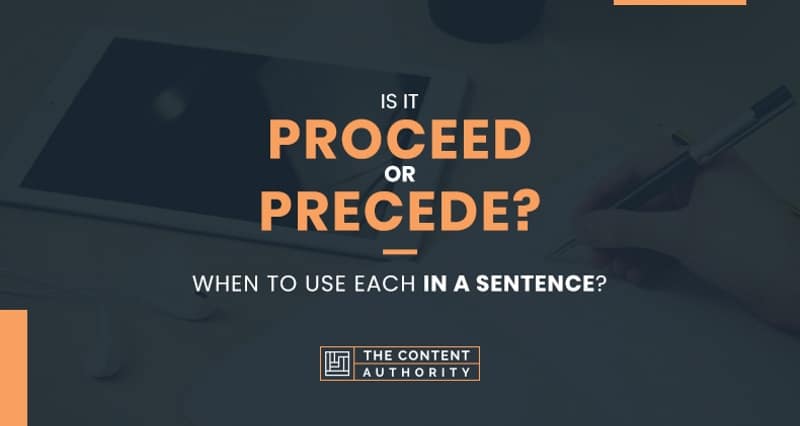Loads of times, we come across English words that their usage appears confusing. While it might be because of their spelling or sound, the goal remains to know when to use each in a sentence. So, is it “proceed” or “precede?” How do you use them in a sentence?
“Proceed” is a verb that conveys action. The word is of Latin origin and means moving onward or forward, especially following an interruption. On the other hand, “precede,” although a verb, conveys that something exists, goes, or occurs before in time. The word is also of Latin origin.
Still, there is so much more to know when it comes to their usage. We bet you are looking to cover the field. Well, we have got that covered. In this post, we will examine in detail when to use both words in a sentence.
When to Use the Word “Proceed” in a Sentence

So you can get right to the right usage of the word “proceed” in a sentence, we will dive into the details of how to use the word. However, to understand this, we will need to keep in mind the meaning and, of course, nature of the word when used in a sentence.
As you can tell, they are not independent of each other as it is a combination of these two factors that determine how a word is used. So, what is the nature of the word “proceed,” and what function does it perform when used in a sentence?
Well, the word “proceed” is a verb in its natural state. As such, when you use the word in a sentence, you use it to convey an action occurring. In turn, you use it to show that a subject is carrying out an action or an object receiving one.
However, that is not the only thing there is to know. More importantly, what action does the word “proceed” convey when you use it in a sentence?
The word “proceed” conveys moving onward or forward. That is to press onward or go forward. Even more, this word is apt to describe a resumption of action following an interruption. In turn, you use the word to convey carrying on or moving forward following an interruption.
It would be best if you kept in mind that the word “proceed” is of Latin origin. It comes from the combination of the Latin words “pro,” which means “forward,” and “cedere,” which means “go.” This combination gives rise to “procedere,” which translates to “go forward” and stands as the root of the word “proceed.”
As such, you use the word “proceed” in a sentence when you want to convey the continuation of an event or action that was interrupted. Now, here are some examples that should help us get the hang of the usage of the word “proceed” in a sentence.
- We will proceed with the hearing once the protest subsides.
- I will now proceed to complete my presentation; apologies for the network disruption.
- We will not proceed with the basketball game until the rain stops; you cannot possibly expect us to play on a wet court.
When to Use the Word “Precede” In a Sentence
Now that we have clarified the use of the word “proceed” in a sentence, we will move to the next object of our attention. That is how to use the word “precede” in a sentence. As always, we will need to examine the meaning of the word to understand the use of the word.
However, just before that, understanding the nature of the word is just as important. Precisely, what function does the word perform in a sentence when you use it. Well, the word “precede” acts as a verb when you use it in a sentence.
In turn, it means that it provides an action in a sentence. Now that we have cleared that up, we can now focus on the meaning of the word “precede.” Precisely, what action does it convey when you use it in a sentence.
Well, when you use the word “precede,” you convey that something exists, goes, or occurs before time. For instance, where you say the election will precede the inauguration, you say that the election will come before the inauguration.
Keep in mind that the word “precede” is of Latin origin. It comes from the combination of the words “prae,” which means “before,” and “cedere,” which means “go.” The combination of these words as “praecedere” stands as the origin of the word “precede” and means go before.
From the above, you use the word “precede” when you want to convey something going ahead and also happening before something else. Just like we stated above, the election is going ahead and taking place before the inauguration.
Now that we have cleared that up let us see some examples showing the use of the word. This will help provide further clarity to the use of the word “precede.”
- It is only normal that a warm-up precedes a tactical discussion in my team; I hope everyone keeps that in mind.
- Everyone understands that an election should precede the swearing-in ceremony; it would be an anomaly to do otherwise.
- We need to ensure that a bang precedes our entry to the stage.
Now, there is something that you need to keep in mind when using the word “precede.” This involves the possibility of misspelling the word. While we understand the confusion between the word “proceed” and “precede,” that is not the only area where confusion can arise.
Precisely, you can also misspell the word ‘precede” with the word “preceed.” In fact, this is quite a common misspelling that people tend to adopt. Some will even go as far as to consider it the variant spelling of the word “precede.”
However, the reality is that the word “preceed” is nothing more than a misspelling that should be avoided. It is a word that does not exist technically. As such, you should ensure that you avoid it when trying to convey that something goes before and exist before something. Where you want to convey that, the appropriate word to use would be “precede.”

Understanding the Difference When Using Both Words
So far, it has become clearer that both words are distinct. However, even without a careful look at both words, it is easier to see why both words are easily confused. In fact, go back in time to their root Latin word, and you will also realize the similarities in both words.
First, “proceed,” means to go forward. On the other hand, “precede” also means to go forward, however, while existing before something else. In turn, anyone might just fall conveniently into the mistake of using the word “proceed” for “precede.” After all, they are both connected on their root words and the meaning of going forward.
However, as you have seen in the explanation above, the use of both words differs. Also, you cannot use them interchangeably as they convey different meanings. So, while they are both verbs, do not for one second confuse both words as interchangeable.
Now, once you have got this clear, you need to remember the difference between both words. After all, that will determine if you get to use them correctly in a sentence. However, we very well know that this can be quite tricky. We have got some tricks up our sleeves that you can use to remember the words easily.
When it comes to using the word “proceed,” it means to go forward or carry on, especially after an interruption. Now, you use the word “proceed” when you want to convey going forward. All you need to remember is to match both words together.
The word “proceed” has an “o,” just like the word “forward.” So, when you need to convey going forward, choose the word with an “o.” In this case, that would be “proceed.”
On the other hand, when it comes to using the word “precede,” it means to exist before something. Now, you use the word when you want to convey that something exists before another. All you need to remember is to match both words together.
The word “precede” has three “e’s.” This is just like the word “before”. So, if you want to convey the meaning that something exists before, choose the word with more “e.” In this case, it would be the word “precede.”
Final Thoughts
You might wonder why there is any confusion in the use of both words. However, it is clear that there are quite some reasons for this, more so the similarities in their origin. However, what is important is recognizing the difference in the words and knowing when to use each word.

We understand that this can be tricky on its own. Well, that is why we are here. In this article, we have discussed in detail the use of both words in a sentence. We have also provided illustrative examples to ensure easy understanding. Now you will know as you read or write when to use each one.
Shawn Manaher is the founder and CEO of The Content Authority. He’s one part content manager, one part writing ninja organizer, and two parts leader of top content creators. You don’t even want to know what he calls pancakes.

